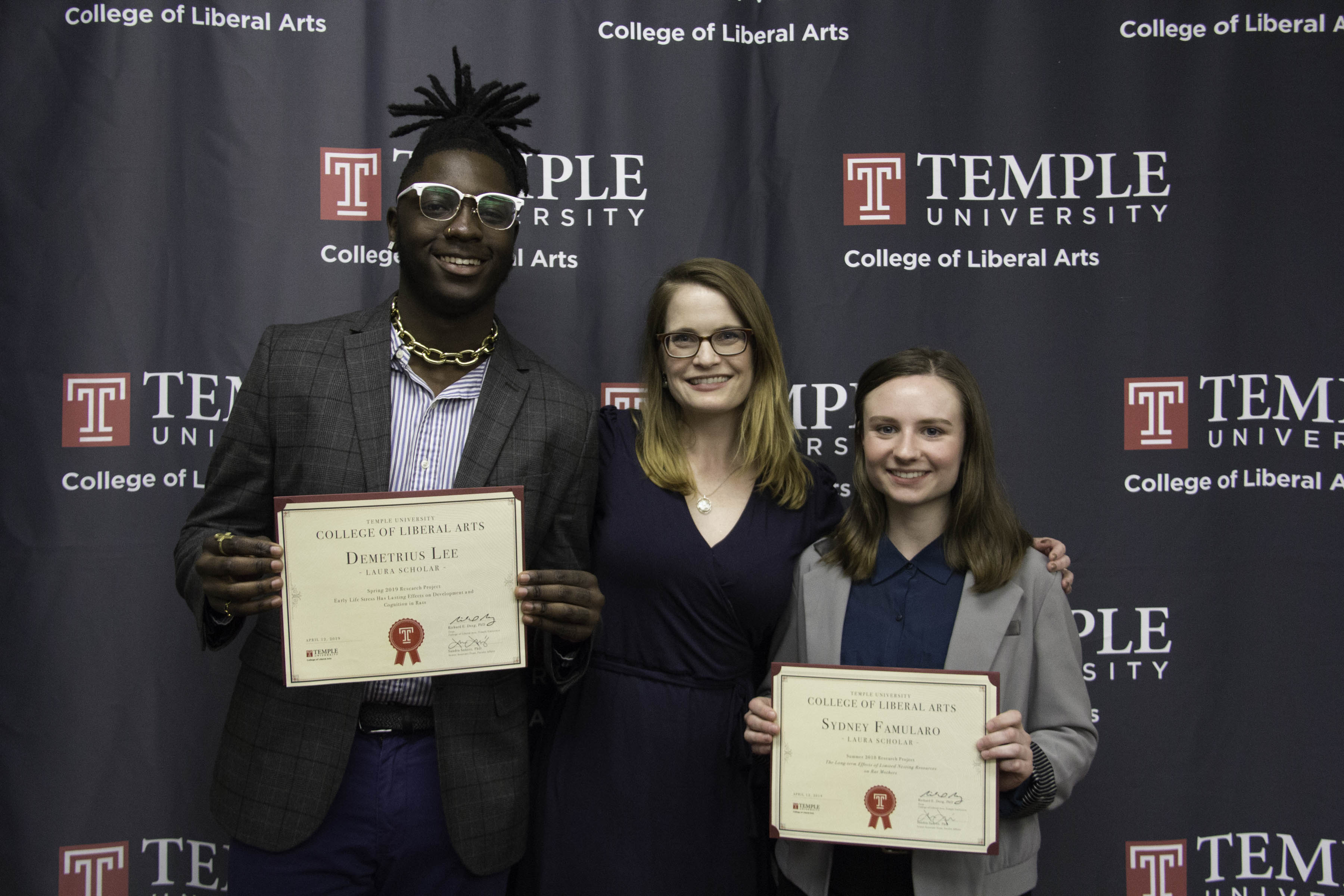Last Friday, Temple University’s College of Liberal Arts (CLA) held its second annual Liberal Arts Undergraduate Research Awards (LAURAs). The LAURAs grant $2,000 each to undergraduate student-faculty member duos to conduct a research project over the course of a semester. Each student earns a $15/hour stipend from the grant while spending 100 hours on the project, which enables students to dedicate their time to developing research skills without having to worry about their financial wellbeing.
“It’s these experiences that you are far more likely to remember two years from now, 20 years from now than what you do in the classroom,” CLA Dean Richard Deeg told assembled students and faculty in the Student Center Friday. Dean Deeg explained that the research and critical thinking skills learned through LAURA projects will help students succeed in whatever career they pursue.
After thanking Senior Associate Dean for Faculty Affairs Sandra Suarez for organizing the LAURAs, the dean passed things off to Temple Vice President for Research Michele Masucci. For Masucci, it was crucial to remind both students and faculty that learning through research is a fundamental part of the college and the university.
“One of the things that makes the LAURA scholars special is that you’re always connected,” said Masucci. “Students are always connected with undergraduate professors in ways that traditional classroom experiences don’t make possible.”
To illustrate this, several LAURA student-professor duos took turns presenting brief overviews of their research projects. For instance, Associate Professor Hamil Pearsall was joined by student Jillian Eller to talk about their project, Gentrification and Green Space Development in Philadelphia, PA.
Their project examined what they dubbed “the green space paradox.” The paradox refers to how green spaces are placed in troubled neighborhoods ostensibly to improve them for residents but often end up contributing to gentrification. The very residents meant to benefit from green spaces, then, are often priced out of their neighborhoods. Through their research, Eller and Dr. Pearsall discovered that the paradox sometimes doesn’t occur and said the next step would be investigating why that is.
[node:pullquote] After several more groups presented their work, Dr. Suarez announced the winners:
Spring 2019
- Debra Bangasser and Demetrius Lee, Psychology and Neuroscience: Early Life Stress Has Lasting Effects on Development and Cognition in Rats
- Eunice Chen and Naomi Szaonto, Psychology: Suicide Prevention in College Students
- Deborah Drabick and Ariana Davis, Psychology: Neurodevelopmental and Contextual Predictors of Intervention Outcomes Among Low Income, Urban Youth
- Tania Giovannetti and Khilah Clark, Psychology: Cognition in Older Adults Who Undergo Cardiac Surgery
- Tania Jenkins and Lisa Platz, Sociology: Qualitative Investigation of Female Resident Physician Burnout in Frontline Specialties
- Judith Levine and Marci Monaco-Vavrik, Sociology: Landing a Job: Moving from College to Employment in the New Economy
- Patricia Melzer and Natalie Schaudeck, FGIS, Alternative Masculinities in the West German Left-Radical Political Movement Autonome
- Ajima Olaghere and Erin Young, Criminal Justice: Motivations for Police Proactivity at the Street-Level: A Meta-Synthesis
- Ingrid Olson and Italia Hanik, Psychology: Interhemispheric Communication Deficits in Collegiate Athletes Post-Concussion
- Moritz Ritter and Collin Wardius, Economics: Transportation Infrastructure and Rural Development: The Case of the PA Turnpike
- Roney Choppin and Jessica Eleanor Andersen, History: A Revolutionary Inheritance: American Colonies after 1783
- David Smith and Benjamin Muzekari, Psychology: Neural Mechanisms Underlying Social Decisions
- Howard Spodek and Luke Sullivan, History: Contemporary Jesuit Education in a Changing Urban India
- E. Rely Vîlcică and Sierra Austin, Criminal Justice: Legitimacy in Corrections: Perspectives from Incarcerated Individuals
- Mathieu Wimmer and Samuel Schumacher, Psychology and Neuroscience: The Impact of Paternal Morphine Exposure on Offspring Impulsive Choice
- Hongling Xie and Shaylyne Christine Nolan, Psychology: Adolescent Social Media Use and Peer Relationships
- Adam Ziegfeld and Megan Maxwell, Political Science: The Politics of Election Alliances in India
Fall 2018
- Judith Levine and Marci Monaco-Vavrik, Sociology and Gender, Sexuality and Women’s Studies: Moving from College to Employment in the New Economy
- Hilary Lowe and Iris Alecia Caballero, History: Philadelphia Historic House Museum Database
- Thomas Olino and Caterina Martin, Psychology: Technology Use as a Moderator of the Relationship Between Stress and Psychopathology
- Ajima Olaghere and Erin Young, Criminal Justice: Motivations for Police Proactivity at the Street Level: A Meta Synthesis
- Hamil Pearsall and Jillian Eller, Geography and Urban Studies: Gentrification and Green Space Development in Philadelphia, PA
- Mortiz Ritter and Collin Wardius, Economics: Transportation Infrastructure and Rural Development: The Case of the PA Turnpike
- Kimberly Williams and Madeleine Cioppi, Anthropology: Bioarchaeology and Mortuary Archaeology of Ancient Oman
- Mathieu Wimmer and Shivam Bhakta, Psychology and Neuroscience: Epigenetic Modulation of FDNF Expression in the Ventral Tegmental Area Following Prolonged Opioid Abstinence
Summer 2018
- Debra Bangasser and Sydney Famularo, Psychology: The Long-term effects of Limited Nesting Resources on Rat Mothers
- Lisa Briand and Hannah Anderson, Psychology and Neuroscience: Examining a Sex-Dependent Role for PKMc in Cocaine Self-Administration and Reinstatement
- Heath Davis and Sydni Young, Political Science: LGBTQ Politics and Public Policy
- Priya Joshi and Zarshedjon Kudratov, English: Contemporary Global Fiction: A Computational Story
- Thomas Olinio and Kristina Dale, Psychology: Relationships Between Life Stress and Self-Report and Behavioral Indices of Impulsivity
- Ingrid Olson and Michael Sobel Misieczko, Psychology: Memory Consolidation in Aging
- Vinay Parikh and Tara Jade-Francois, Psychology and Neuroscience: Longitudinal Assessment of Anxiety-like Behavior and Motor Activity in a Mouse Model of Sporadic Alzheimer's Disease
- David Smith and Benjamin Muzekari, Psychology: Modulating Perceptions of Fairness with Noninvasive Brain Stimulation
- Jeffrey Ward and Kayla McComsey, Criminal Justice: Transitions on Adult Development
- Leslie Reeder-Meyers and Hannah Wolfram, Anthropology: Historical Ecology and Oyster Restoration in Chesapeake Bay
Congratulations to all of our LAURA winners this year! The college looks forward to continuing this wonderful research tradition with a new batch of student-faculty research projects in the year ahead.

